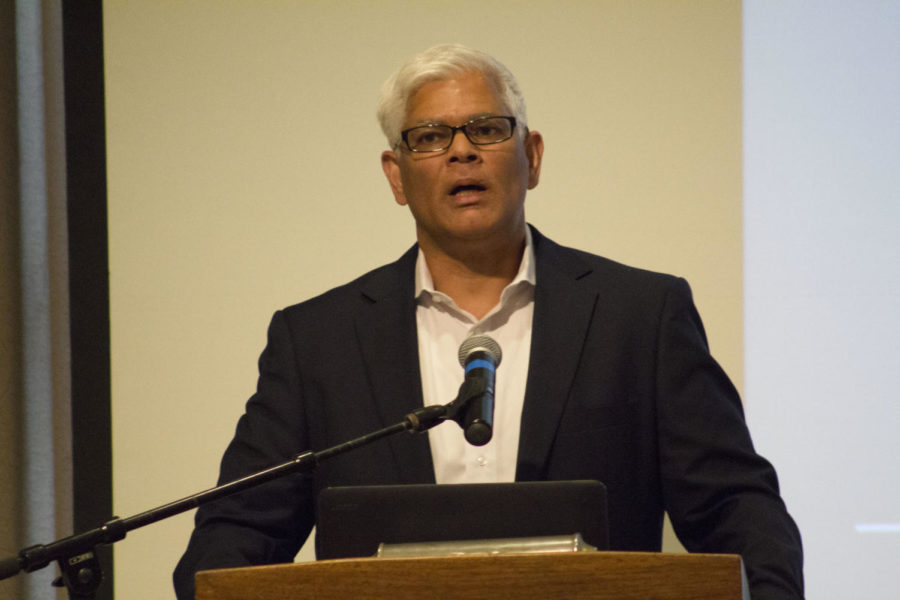Shashi Buluswar shares technologies for global sustainability
Kennedy DeRaedt/Iowa State Daily
Founder and former director of the Lawrence Berkeley National Laboratory’s Institute for Globally Transformative Technologies (LIGTT), Shashi Buluswar, spoke about his team’s research findings on technology around the world. The report is called “50 Breakthroughs: Critical Scientific and Technological Advances Needed for Sustainable Global Development.” Buluswar talked about global health, human rights, water resources and access to electricity in the Sun Room in the Memorial Union on April 12.
April 12, 2017
Global sustainability is a hot topic in today’s world, and Shashi Buluswar has worked with colleagues to create an index of technologies that will help sustain global development.
Buluswar is the CEO of the Institute for Transformative Technologies, and his current work is on trying to make some of the 50 technologies listed in his team’s report “50 Breakthroughs: Critical Scientific and Technological Advances Needed for Sustainable Global Development” into a reality.
“We’re hopeful that our work will make a pretty big dent in these problems,” Buluswar said.
The problems that Buluswar mentions are many, and he described them in his lecture Wednesday in the Sun Room of the Memorial Union.
Buluswar’s future technologies research has focused mostly in areas of low development and high poverty rates, frequently the regions of South Asia and Sub-Saharan Africa.
In his lecture, Buluswar outlined the effects extreme poverty has had in these areas, from life expectancy and child mortality statistics to governance and civil rights statistics.
“Political fragility is one of those fundamental traps that has proven very difficult to get out of, and is compounded by poverty, and all these issues are quite related,” Buluswar said.
He also touched on the heightened effect a suffering environment has in the poor areas, such as sanitation and indoor air pollution.
The approach of Buluswar’s 50 breakthroughs study was “how can we alleviate poverty and suffering without destroying the planet,” Buluswar said.
Buluswar touched on a few of the issues that they have already started work toward, such as bringing fertilizer to farmers in these areas. But two of the biggest obstacles are cost for the people and funding support.
“I call this the Viagra problem,” Buluswar said. “Is there value for an effective Malaria vaccine? Absolutely. But few here or in Europe are dying from Malaria, and there is no market for that vaccine. Yet the market has deemed Viagra has value, so there is Viagra and no effective Malaria vaccine.”
At Buluswar’s institute, there has been progress in multiple areas of the 50 breakthroughs, including development of a cheap and sanitary toilet and mini-solar power grids to implement in northern India.
Students in the crowd were engaged learning about what Buluswar has worked on.
“What [Buluswar] is doing in trying to help the large portion of impoverished people in the world, and if he is successful, that may help solve some of the biggest problems of the world,” Prashant Singh, postdoc research associate at the Ames Laboratory.
Buluswar was at Iowa State as the keynote speaker for the Graduate and Professional Research Conference, and he was presented with a plaque to honor the keynote by the Graduate and Professional Student Senate before his speech.
“To me, it is really important to recognize that the world’s smartest minds need to work on the world’s hardest problems,” Buluswar said.
















